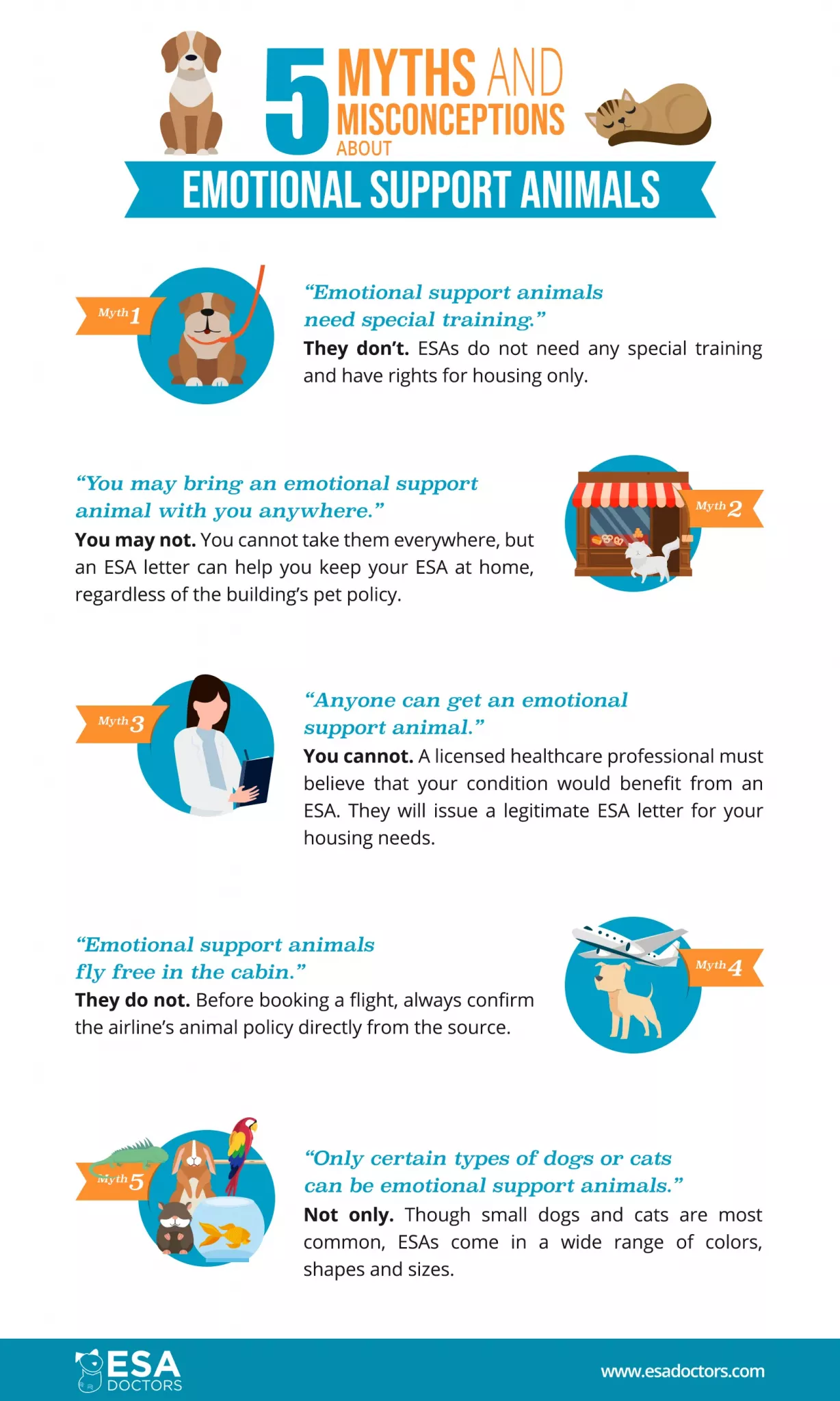No, emotional support animals (ESA) and service animals like psychiatric service dogs do not have the same rights when it comes to travel or going to a restaurant. That is a common misconception. The same goes for landlords who try to reject an emotional support animal because they are not certified as a service animal. If you have a valid ESA letter, the landlord cannot reject your ESA as it is protected in housing like a service animal under the Fair Housing Act (FHA).
If you’re curious about fact vs. fiction and common misunderstandings regarding emotional support animals, we’re here to help. Click the links below to go directly to the topic you want to learn about, from housing rights and qualifications to traveling with your ESA. Or read the entire post to learn more about what is real and what is fiction when your rights as an emotional support animal owner are challenged.
Myth 1: Emotional Support Animals Need Special Training
This is a myth. Emotional support animals do not need any special training as they are there to provide comfort only, whereas service dogs must be trained to do a specific task. Emotional support animals are valuable to the owner’s emotional and mental well-being, but the owner only needs a legitimate ESA letter to gain their housing rights.
Service dogs have additional rights as they are trained to perform specific tasks, such as guiding a visually impaired owner, detecting an imminent seizure for someone with epilepsy, fetching medication, or detecting low blood sugar to warn a person with diabetes. These tasks can save their owners’ lives and are more substantial than only needing to provide emotional support in their home.
Emotional Support Animals do not need any special training and have rights for housing only.
ESA Doctors, est. 2015
Myth 2: You May Bring an Emotional Support Animal with You Anywhere and Anytime
This is a myth. ESAs are not allowed to always accompany their owner. In public venues, ESAs will just be treated as normal pets. Some places, like restaurants, may not allow pets because of health codes. Other establishments, including government buildings, may have rules that prohibit pets.
Under the Fair Housing Act, tenants who have an ESA and were issued a legitimate ESA letter from their LMHP are allowed to have their animal in a non-pet building and to have their pet deposit and other pet fees waived. But the FHA applies only to your primary residence and not to other places where you may stay, like a hotel.
You might not be able to take them everywhere, but an ESA letter can help you keep your emotional support animal at home, regardless of the building’s pet policy.
ESA Doctors, est. 2015
Myth 3: Anyone Can Get an ESA
This is mostly a myth. The truth is that everyone can apply to get an emotional support animal and ESA letter, but not everyone will qualify. If the licensed health care provider does not think the animal will alleviate the symptoms of the mental disorder, they will not provide you with a letter.
If your primary health care provider will not provide you with a letter, you can always seek advice from a different provider or use an online service, like ours. These connect you with a licensed health care provider who specializes in the benefits of emotional support animal ownership. It’s common for people to get rejected for an ESA letter the first time because their regular therapist is not familiar with ESAs, but then qualify later when they get a second opinion. That is why this is both a myth and a truth.
A licensed healthcare professional must believe that your condition would benefit from an ESA before they will issue a legitimate ESA letter for your housing needs.
ESA Doctors, est. 2015
If you feel like an emotional support animal is right for you, get started with ESA Doctors today!
Myth 4: ESAs Fly Free in the Cabin
This is a myth. ESAs do not fly free in the cabin as they are considered regular pets, not service dogs. Service dogs, including psychiatric service dogs, do have travel rights, which is where the confusion might come from.
Most major airlines allowed ESAs to fly in the cabin until the law was changed in 2021, so ESAs no longer qualify. If you’re wondering whether your emotional support dog could also be a service dog, check out our guide on how to make an ESA a service dog.
Before booking a flight, always confirm the airline’s animal policy directly from the source.
ESA Doctors, est. 2015
Click here to see if you qualify for a Psychiatric Service Dog

Myth 5: Only Certain Types of Dogs or Cats can be ESAs
The ESA guidelines set forth by the U.S. Department of Housing and Urban Development (HUD) state that landlords cannot disqualify an ESA due to breed or weight. The pet you already have may qualify as your ESA, as long as it is a small, domesticated animal typically kept in the home.
Furthermore, the animal does not need to be a dog or a cat. There are many other domesticated animals, such as fish, gerbils, birds, or turtles, that can live with you in a home with a “no pets” policy, as long as you have a legitimate ESA letter.
Though small dogs and cats are most common, emotional support animals come in a wide range of shapes and sizes.
ESA Doctors, est. 2015
Could an emotional support animal benefit you?
If you are interested in getting an emotional support animal as part of your mental well-being plan, we can help. ESA Doctors can help connect you to an LMHP who is able to write ESA letters and is licensed in your state.
You and your mental health provider can evaluate the pros and cons of having an emotional support animal to provide comfort, alleviate depressive symptoms, or give you a sense of purpose.






Leave a Comment